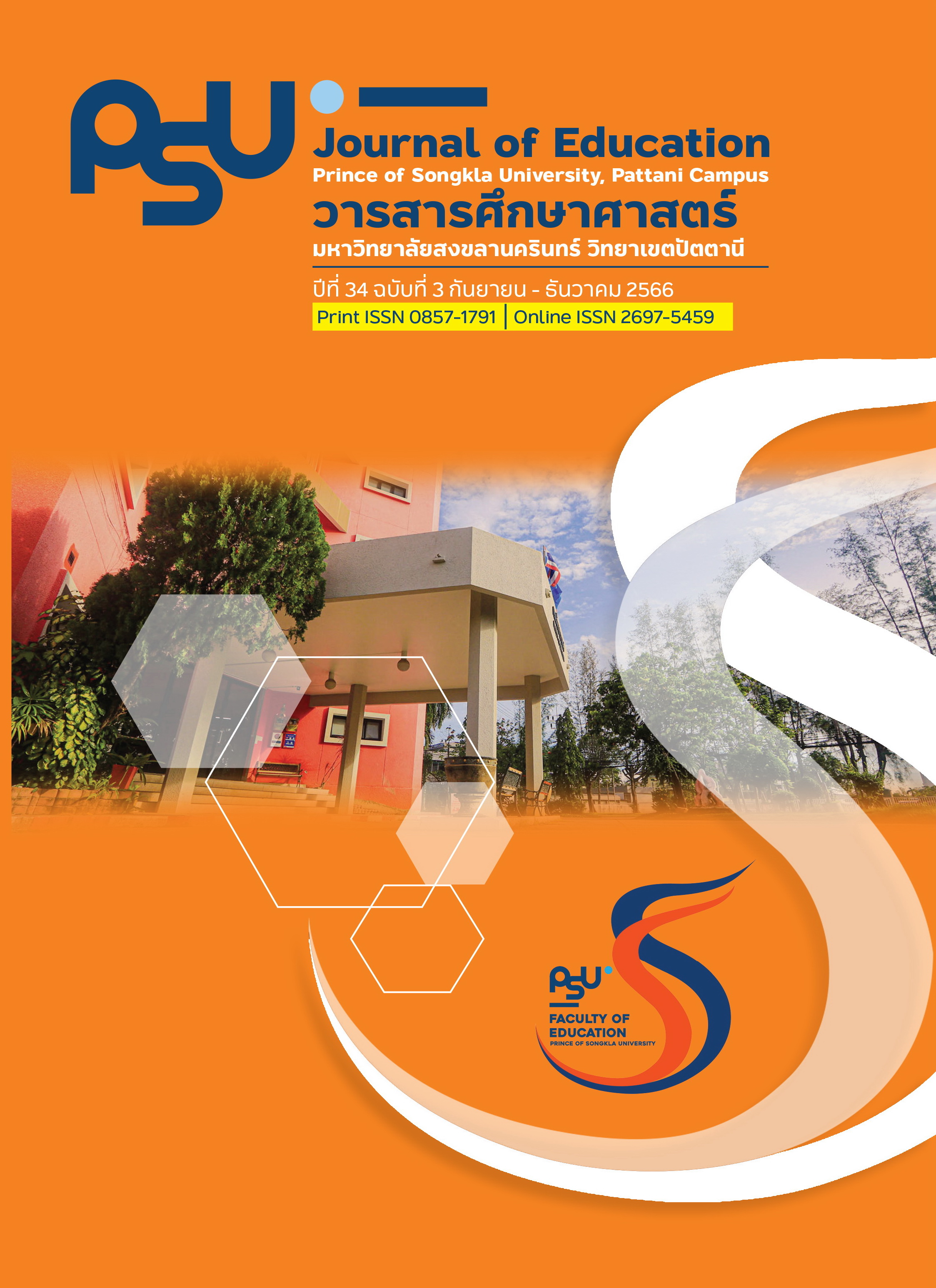ปัจจัยเชิงสาเหตุที่มีอิทธิพลต่อความเป็นนักเคมีของนักศึกษาสาขาเคมีในประเทศไทย
Main Article Content
บทคัดย่อ
ปัจจัยที่ส่งเสริมความเป็นนักเคมีตามทัศนะของครูผู้สอนวิชาเคมี อาจารย์ผู้สอนสาขาเคมี นักเคมีหรือนักวิจัยด้านเคมีและเจ้าหน้าที่ห้องปฏิบัติการเคมีในประเทศไทยมีหลายประการ ซึ่งมีความน่าสนใจอย่างยิ่งว่ามีปัจจัยใดบ้างที่จะมีอิทธิพลต่อความเป็นนักเคมีกับนักศึกษาสาขาเคมีในประเทศไทย การวิจัยนี้มีวัตถุประสงค์เพื่อศึกษาปัจจัยเชิงสาเหตุที่มีอิทธิพลต่อความเป็นนักเคมีของนักศึกษาสาขาเคมีในประเทศไทย โดยกลุ่มตัวอย่าง คือ นักศึกษาสาขาเคมีทั้งหลักสูตรด้านศึกษาศาสตร ์ และด้านวิทยาศาสตร์ ที่กำลังศึกษาในระดับชั้นปีที่ 3-4 จำนวน 550 คน ซึ่งการวิจัยครั้งนี้มีผู้ตอบแบบสอบถามออนไลน์มาทั้งหมด 586 คน รวบรวมข้อมูลด้วยแบบสอบถามที่มี 3 ส่วน ได้แก่ ข้อมูลทั่วไป ความคิดเห็นเกี่ยวกับความเป็นนักเคมี ความคิดเห็นเกี่ยวกับปัจจัยที่ส่งเสริมความเป็นนักเคมี ผลการวิเคราะห์เส้นทางอิทธิพลของโมเดลสมการโครงสร้างด้วยวิธี PLS-SEM พบว่าสนับสนุนเส้นทางอิทธิพลที่กำหนด 10 เส้นทาง ซึ่งมี 2 ปัจจัยที่มีอิทธิพลเชิงบวกต่อความเป็นนักเคมี อย่างมีนัยสำคัญทางสถิติที่ระดับ .01 ได้แก่ ปัจจัยด้านรูปแบบการจัดการเรียนการสอนรายวิชาเคมี และปัจจัยด้านลักษณะของบุคคลต้นแบบทางเคมี
Article Details

อนุญาตภายใต้เงื่อนไข Creative Commons Attribution-NonCommercial 4.0 International License.
เอกสารอ้างอิง
Angnakoon, P., Tubpun, T., & Sophonhiranrak, S. (2020). Investigating STEM career Interest and Attitude among 9th grade students in Thailand (Bangkok metropolitan region). Journal of Graduate Studies Valaya Alongkorn Rajabhat University, 14(2), 105-125. [inThai]
Chalupa, R. & Chalupa, R., & Nesměrák, K. (2020). Chemophobia versus the identity of chemists: heroes of chemistry as an effective communication strategy. Monatshefte für Chemie-Chemical Monthly, 151, 1193-1201.
Charoenyot, S., Nillapun, M. & Patphol, M. (2020). The development of an instructional model based on active learning to enhance chemistry learning and critical thinking skills concept of upper secondary students. Suthiparithat journal, 34(109), 46-57. [in Thai]
Kaensar, S., Pattiyathan, S.& Sittiprapaporn, W. (2012). The Causal Factors Influencing Chemistry Learning Achievement of Matthayomsueksa 5 Students Sri Sa Ket Province. Journal of Educational Measurement Mahasarakham University, 18(2), 159-168. [in Thai]
King Mongkut’s University of Technology Thonburi. (2015). Bachelor of Science Program Applied Physics. http://www.physics.kmutt.ac.th/version2558/cirriculum2558/bsc_applied_physics. html. [in Thai]
Laszlo, P. (2006). On the self-image of chemists. International Journal for the Philosophy of Chemistry, 12(1), 99-130.
Liwan, A., Lateh, A. & Musor, H. (in press). A Study of Becoming a Qualified Chemist and Its Enhancing Factors in the Views of Teachers, Lectures, and Chemist Staff in Thailand. Humanities and Social Sciences Journal of Graduate School, Pibu lsongkram Rajabhat University, 18(1). [in Thai]
Nakjui, S. (2015). The factors affecting scientific inquiry ability of matthayomsuksa 1 students Under the educational service area office Kanchanaburi. [Master dissertation, Kanchanaburi Rajabhat University]. E-Thesis Kanchanaburi Rajabhat University. [in Thai]
Pattrawiwat, K., Langka, W., Anuruthwong, U., & Poolpatarachewin, C. (2016). Guideline Development of Quality Gifted Education in Science, Mathematics, and Technology by Using the Application of Futures Research. Journal of Behavioral Science for Development, 8 (2), 151-168. [in Thai]
Puttaniyom, D.,Tirakanant, S., & Punthai, B. (2018). Factors affecting learning outcomes of science subject among prathom suksa 5 students of schools under the Bangkhae district office, Bangkok. Journal of Yanasangvorn Research Institute, 9(2), 74-83. [inThai]
Roamchart, P., Yoelao, D., Seedagulrit S., Boonprakob, M. (2011). Antecedents of Role Commitment, Identity, Learning Motivation, and Role Ambiguity concerning Role Performance of Gifted Students in Science and Mathematics. Journal of Behavioral Science, 17(1), 55-78. [in Thai]
Ruengrung, S., Lateh, A. & Kaewtubtim, P. (2021). The Studying on Qualified Physicist and the Factors Enhancing towards Qualified Physicist as Perceived by Lecturers and Physics Personnel in Thailand. Humanities and Social Sciences Journal of Graduate School, Pibulsongkram Rajabhat University, 16(2), 78-88. [in Thai]
Saengpromsri, P., Nuangchalerm, P. & Chantiratikul, P. (2015). Comparisons of learning achievement, integrated science process skills, and attitude towards chemistry learning for Matthayomsueksa 5 students between STEM education and conventional methods. Journal of Education, Mahasarakham University. [Special issue]. [in Thai]
Sem, S., Wongnam, P., & Ngammeerith, N. (2019). The Causal Factors Affect Science Process Skills of Prathom Suksa VI Students under the Jurisdiction of the Area Service Office Nakhon Nayok Province. Journal of Educational Review Faculty of Education in MCU, 6(3), 78-88. [in Thai]
Thabuengkan, S. (2016). Driving STEM education in school. IPST magazine, 19(3), 40-41. [in Thai]
The Institute for the Promotion of Teaching Science and Technology. (2017). Learning Framework and Guidelines for Organizing an Integrated Learning Experience of Science, Technology and Mathematics at the Early Childhood Level According to the E arly Childhood Education Curriculum 2017. https://www.scimath.org/ebook-science/download/1535/11322/88. [in Thai]
Thongchai, C. (2018). The effects of inquiry method on physics learning achievement and attitude toward physics of Mathayomsuksa five students. [Master dissertation, Nakhon Sawan Rajabhat University]. NSRU KNOWLEDGE SHARING. [in Thai]


